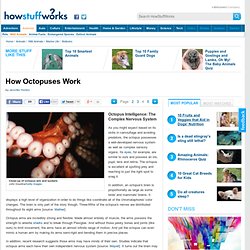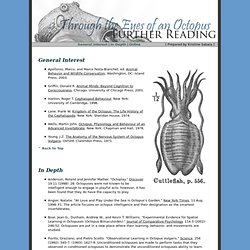

The%20Octopus-%20A%20Model%20for%20a%20Comparative%20Analysis%20of. Octopus Intelligence: The Complex Nervous System" As you might expect based on its skills in camouflage and avoiding predators, the octopus possesses a well-developed nervous system as well as complex sensory organs.

Its eyes, for example, are similar to ours and possess an iris, pupil, lens and retina. The octopus is excellent at spotting prey and reaching to just the right spot to snag it. In addition, an octopus's brain is proportionally as large as some birds' and mammals' brains. It displays a high level of organization in order to do things like coordinate all of the chromataphores' color changes. The brain is only part of the story though.
Octopus arms are incredibly strong and flexible. In addition, recent research suggests those arms may have minds of their own. Octopuses use their limbs for everything from hunting to mating. Through the Eyes of an Octopus: Further Reading. General Interest Apollonio, Marco, and Marco Festa-Bianchet, ed.

Animal Behavior and Wildlife Conservation. Washington, DC: Island Press, 2003. Griffin, Donald R. Animal Minds: Beyond Cognition to Consciousness. In Depth Anderson, Roland and Jennifer Mather. Online Feldman, Gene Carl. Thinking like an octopus. Stephanie Mitchell/Harvard Staff Photographer Peter Godfrey-Smith has been intrigued by octopuses for years, diving in and around Sydney Harbour during summer breaks in his native Australia.

Stunned by the lack of scientific research on octopuses, Godfrey-Smith is now studying their intelligence, and whether their tentacles have minds of their own. If you were an octopus, would you view the world from eight different points of view? Nine? The answer may depend on how many brains an octopus has, or, to say it another way, whether the robust bunches of neurons in its coiling, writhing, incredibly handy arms bestow on each of them something akin to a brain. The idea of a distributed mind among animals is not new, according to Peter Godfrey-Smith, who focuses his efforts on the philosophy of science. “This suggests that animal minds lack the cohesiveness that humans have,” said Godfrey-Smith, a philosophy professor at Harvard. There may be other explanations for the observations. Octopus Arms Found to Have "Minds" of Their Own. John Roachfor National Geographic News September 7, 2001 An octopus may get some mileage out of the excuse "I can't help it, my arm has a mind of its own," as it goes for an extra sea morsel—at least more than can a human who reaches too often into the cookie jar.

Neither, however, can lay full blame for their greed on their appendages. For humans, the brain inside the human skull, the same brain that sees the cookie and wants to eat it, controls the reach into the cookie jar. Octopus arms, on the other hand, really do have a mind of their own, according to research reported in the September 7 issue of Science. The brain inside the octopus skull sees a tasty sea morsel and decides to eat it, but to get the morsel into its mouth the brain inside the skull sends a message to a mass of nerves inside the octopus arm. Controlling Freedom Octopus arms, unlike human arms, are not limited in their range of motion by elbow, wrist, and shoulder joints. Severed Brain and Functioning Arm.